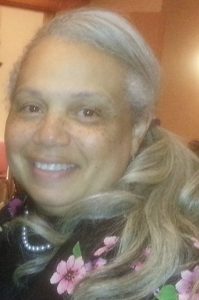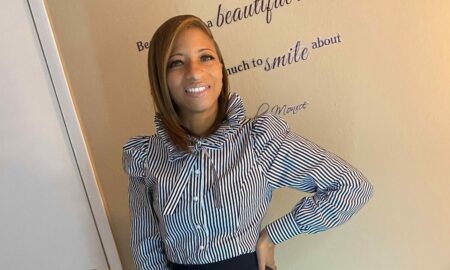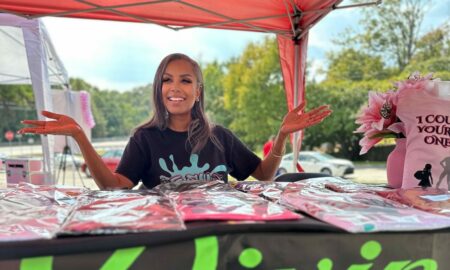
Today we’d like to introduce you to Pamela-Faith Jackson.
Thanks for sharing your story with us Pamela-Faith. So, let’s start at the beginning and we can move on from there.
I returned to Spelman College after a 15-year hiatus, majored in drama with no desire to act, signed up for a drama lit class taught by the late Dr. Paul Jackson, and discovered my niche. I was introduced to Shakespeare, Brecht, Douglas Turner Ward, and George C. Wolfe.
I learned about groundbreaking theaters like the Negro Ensemble Company (NEC) in New York, Atlanta’s Jomandi Productions where I was introduced to Carole Mitchell Leon and Kenny Leon, and the Adler’s Horizon Theater all of which provided nurturing environments for emerging artists like myself. Never in my wildest dreams did I imagine that I would be accepted into the prestigious M.F.A. degree program at Columbia University School of the Arts which afforded me the opportunity to meet Ward and Wolfe, and eventually publish plays by them both in an anthology that I co-edited with Karimah called BLACK COMEDY: 9 PLAYS, A CRITICAL ANTHOLOGY WITH INTERVIEWS AND ESSAYS.
It was at a NEC rehearsal where I was interning that I met playwright Charles Fuller who wrote “A Soldier’s Play” the 1982 Pulitzer Prize For Drama winner. He later wrote the screen adaptation which was nominated for an Academy Award. That day, I timidly walked over to Mr. Fuller who had been listening to lines from one of his “WE” series plays being read by Michelle Shay and Samuel L. Jackson. He looked up, asked my name, and passionately began to share his philosophy. He believes that every African American has a responsibility to write at least one book to add to library shelves that tells our diverse stories. Since that day, I have retold the story of our encounter and made it a priority to encourage writers to write regardless of race, and to support them in the new play development process. I was able to practice my skills as dramaturg during my time as the literary manager at Crossroads Theatre Company under the masterful tutelage of Sydne Mahone. Four years later, as Associate Producer for the Negro Ensemble Company, I facilitated the Playwrights Unit allowing me to get first-hand experience with the process.
Fast forward to my return to Atlanta and my 2nd career as an educator in Fulton County Schools. I missed the interaction between myself and writers and was overjoyed when two 4th graders rushed to my classroom. The principal had agreed to produce their original plays in the school’s cafeteria. Their scripts, nearly devoid of structure and much of the fundamentals of technique, were filled with energized characters that riveted me. I reverted from charter school kindergarten teacher to professional dramaturg, discussing playwriting with these eager if inexperienced young writers. The fascinating possibility of an organic connection between theatre, new play development, and primary education opened up and the Young Playwrights Workshop was born.
I was surprised by the number of students who joined the two hopefuls completing scripts in the first year. We needed a method to determine which plays would receive productions. Thus in the Short Sensations Play Reading series, the inaugural season of Young Voices with New Visions Short Play Fest, students themselves picked the line-up. Though this meant that every promising script would not be mounted, unselected students seemed surprisingly undeterred, already working on plays for the next competition. During the 2nd season, Young Playwrights Units inspired by the NEC model were springing up in other schools and public libraries. Prodded by Mahone to approach the Alliance Theatre, YVNV received a nod of approval from the theatre’s former Director of New Projects, Celise Kalke and Director of Education, Chris Moses. Atlanta’s Tony Award Winning Regional Theatre opened its doors to a wonderful performance space where professionals and novices could work together to provide an even more meaningful clarifying experience for the writers. One of the YVNV Short Play Fest directors named Neko Parham (Troy Wiggins in “The Wire”) had this to say:
“I had the honor of directing an amazing group of young people during the Young Voices With New Visions 3rd Annual Playwrights Fest at the Alliance Theatre. These kids are insanely gifted and bright! Now I have to be honest, I love my life as an actor, writer, director, etc., but nothing comes close to that feeling of seeing the young playwrights’ faces light up as they see their hard work come to life. Absolutely unexplainable!”
With each passing year, provocative works by and about kids made their way through an even more rigorous vetting process that soon involved university professors and theatre professionals. The often charged content of the plays created challenges, as well as, opportunities. Howard Stein, Chair Emeritus at Columbia University and Young Voices With New Visions former Advisory Board Member, cautioned me about the sensitive and vital interplay between dramaturg and playwright. He advised me to remember that exploration of themes, characters, and situations often mirrors a most private and vulnerable part of a playwright. He admonished that a writer’s relationship to a professional reader is one of trust. So often, my playwrights exposed pieces of their minds, spirits, and privileged histories in the work. Only later would they learn to separate themselves from the characters when they desired to draw more artfully and selectively from their experiences in crafting dramatic narrative.
YVNV not only serves as a laboratory for new work by budding dramatists but also provides community members the opportunity to play a part in the developmental processes with artists from Atlanta and beyond. YVNV is an invaluable resource that gives young writers the time and the encouragement to focus on challenging themes in the hope of facilitating a dialogue between playwrights, performers, and audience. The program’s connection to the theatre and academic communities runs deep and creates a safe haven that brings audiences inside the minds of articulate primary and secondary students giving voice to their generation.
YVNV now accepts scripts from exceptionally talented and academically motivated 3rd grade – 12th students from anywhere in the United States. College students may submit short plays to be considered for the Undergraduate Playwrights Collective.
Has it been a smooth road?
Money and space have been mountains for us to climb time and time again. But I believe navigating through spaces and around sometimes non-believing faces to identify youth who actually have a unique gift to write has been the most challenging.
So let’s switch gears a bit and go into the Young Voices With New Visions story. Tell us more about the business.
Young Voices With New Visions is a new play development vehicle for writers young and old. YVNV provides writers the opportunity to create original work, hear it read, see it performed.
What are you most proud of?
I am most proud of the writers we have nurtured over the years who reach back to say thank you for helping me to own my voice and build my confidence. Young Voices With New Visions has produced more than 30 short plays by students from coast to coast and published 12 of them in a collection called, PLAYS BY YOUTH ABOUT YOUTH FOR YOUTH: A Critical Anthology With Essays And Enrichment which was most recently added to the Atlanta Fulton Public Library Collection.
I think what sets Young Voices With New Visions apart from others is the fact that I am a trained dramaturg who admires playwrights and their ability to tell a good story. Because of my background as a production dramaturg, as well as, one who works closely with writers on scripts in the infancy stages, it is a YVNV practice to provide unlimited individualized attention to each writer, and to identify the artistic and technical collaborators who understand and respect the playwright’s vision throughout the production process. Theatre is a collaborative art form. YVNV has established opportunities for emerging theatre professionals, and a college to career track for high school and undergraduate directors, lighting/sound designers, stage managers, and actors. Veteran theatre artists have been a staple in the process of training the next generation.
How do you think the industry will change over the next decade?
American Theater will continue to become more diverse. Dramatic Literature will continue to mirror the human condition of the past and present, as well as, telegraph the future. Stories told by people of all ethnicities and ages will be included in the canon of important and influential work. What I am most hopeful for is that drama will continue to gain credibility as a therapeutic intervention option used by more institutions (i.e. schools, juvenile detention centers, etc.) and mental health experts. Theatre can be a powerful change agent within our communities.
Contact Info:
- Website: yvnvplays.org
- Email: yvnvplay@gmail.com
- Facebook: https://www.facebook.com/yvnvplays/
- Twitter: @yvnvplaysbykids








Getting in touch: VoyageATL is built on recommendations from the community; it’s how we uncover hidden gems, so if you know someone who deserves recognition please let us know here.




















Antonne
April 14, 2019 at 2:46 pm
Oh how I love me some Pamela-Faith! Wow! I have been knowing Pamela-Faith for many years. She never ceases to amaze me with her level of dedication and enthusiasm for these kids. She is one of God’s greatest angels sent here from heaven to give back to others and help them flourish. Kudos Pamela-Faith, kudos!